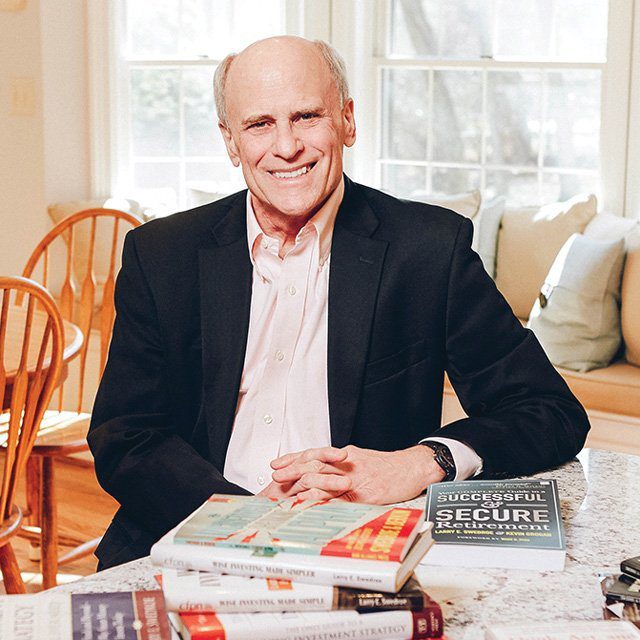Larry Swedroe: The Best Investments for the New Market Reality

Clients urgently need to face reality: Expected returns aren’t what they used to be, so investors “have to get exposure to much different risks than they’re used to,” argues Larry Swedroe, chief research officer of Buckingham Strategic Wealth, in an interview with ThinkAdvisor.
Persuading clients to think about the rising risk of equity investing, as well as the increasing risk of a hard landing for the economy means helping them manage those risks by “reducing their exposure to equites and longer bonds” without moving to cash, Swedroe says.
For many clients, the answer is alternative investments. And that’s just what Swedroe has been recommending, as he reveals in the interview.
Such vehicles include private floating-rate debt, long-short factor funds, litigation finance, private credit and reinsurance funds.
Swedroe’s analyses of academic research inform the RIA’s investment strategy recommendations.
Looking at the heightened probability of a hard economic landing, or recession, Swedroe calls the Federal Reserve’s decision not to act promptly to curb inflation at a time of “massive fiscal stimulus and a strong economy” and keeping interests rates down “one of the most incompetent decisions ever made.”
In the interview, the author of “Your Complete Guide to a Successful & Secure Retirement,” co-written with Kevin Grogan, discussed what he considers the ideal investment portfolio — think Harvard and Yale — which uses a strategy where “the risks are more equally distributed.”
Swedroe’s latest book is “Your Essential Guide to Sustainable Investing” [Harriman House], co-written with Samuel C. Adams.
In our conversation, Swedroe names the chief benefits to green stocks set against the background of the “Holy Trinity” of brown stocks, aka “sin stocks,” which for the last 100 years have “outperformed the market by about 3% a year,” he says.
A member of the firm’s investment policy committee, Swedroe was previously vice chairman of Prudential Home Mortgage and senior vice president and regional treasurer of Citicorp.
ThinkAdvisor interviewed Swedroe on June 10. He was speaking from St. Louis, where Buckingham is based.
He said that his recommendation to clients was to invest “in things that aren’t generally available in public markets … We try to buy different risks and do it with as low cost as we can.”
Here are excerpts from our interview:
THINKADVISOR: How should people be investing for retirement right now?
LARRY SWEDROE: We’ve been strongly recommending that investors change the way they think about their portfolios. We’re trying to get people to recognize that they live in a world with much lower expected returns than they’ve been used to.
They have to get exposure to much different risks than they’re [accustomed] to. That means maybe investing in things that aren’t generally available in public markets.
So we’ve been trying to get our clients to add more and more of those assets. We try to buy different risks and do it with as low cost as we can.
Broadly, what’s your approach?
We want to invest systematically; some call it passively. But it’s about avoiding trying to find alpha, if you will, with individual stock selection or market timing.
We’re trying to get clients to think about the risks of equities, which have gone up, as has the risk of a hard landing because of policy mistakes — too much fiscal and monetary stimulus.
The risk of inflation has gone up. So we need to think about how investors can insulate or minimize those risks by reducing their exposure to equities and longer bonds without just going to cash, where you’re doomed to fail because you get no return.
What sorts of alternative investments are you recommending?
A lot of our clients have very significant investments in private floating-rate debt. We use a fund called CliffWater Corporate Lending Fund (CCLFX). It’s all floating-rate debt and currently yielding about 7.5%.
If rates go up, this [fund] will immediately move up in yield, and you’ll be hedged.
It does have some economic cycle risk because companies could go bankrupt. But it has so much protection.
You’re taking some risk, but you’re getting a massive premium. Today, 5-year Treasurys are 3%; [with this fund] you’re getting 7.5%.
CliffWater recently came out with another vehicle, an extended lending fund, called CELFX.
What other alternatives are your clients investing in?
Things like structured life settlements, drug royalties and private real estate, which can have a focus on low-duration assets.
If you have a 10- or 20-year lease on a property, that’s not a good inflation hedge. But if you’re invested in single-family homes for rental, that’s a one-year lease — and every month some of the rents go up.
So we’re investing in vehicles that invest in things that have shorter-term duration, like single-family homes for rental, warehouses with short-term leases, hotels — things where prices can adjust quickly.
What about commodities?
That’s another example of an asset class that can provide diversification and benefits.
And then there are long-short factor funds. We invest in one called QSPRX [AQR Style Premia Alternative Fund Class R6]. It’s long value, short growth — and totally uncorrelated to stocks and bonds.
How have these alternatives been performing?
Every single one is up this year, while both stocks and bonds are getting hammered.
What others are you investing in?
Litigation finance and private credit. Again, there’s no exposure to interest-rate risk or equity-type risk. It’s a different risk. They all have a liquidity premium.




